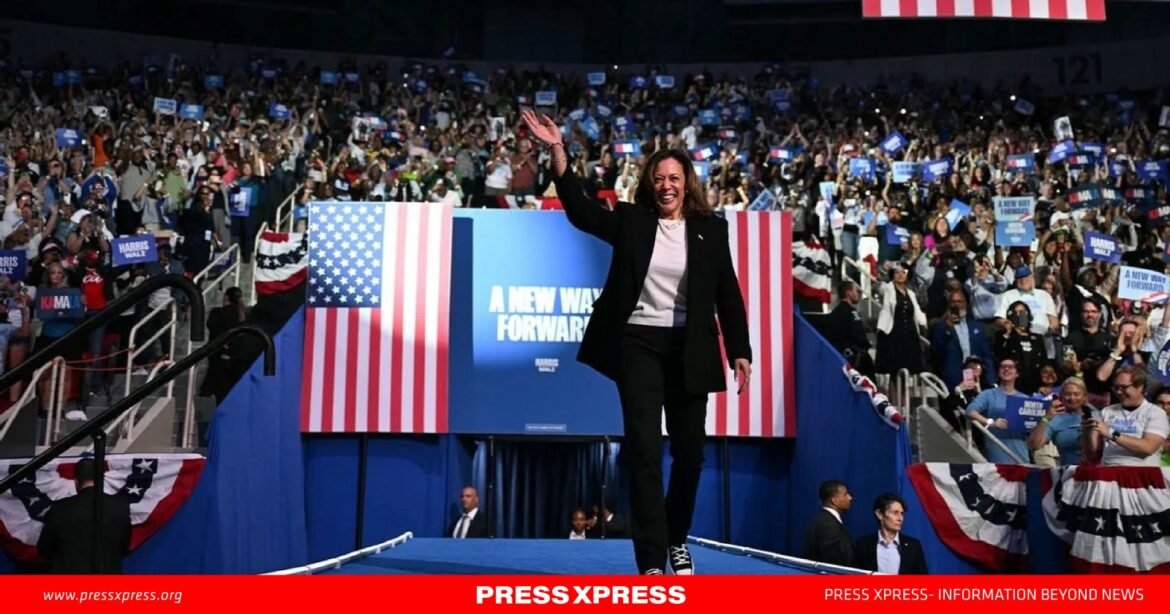With the 2024 U.S. presidential election just days away, Kamala Harris, the Democratic nominee, delivered a powerful closing argument in Washington, D.C. Addressing tens of thousands of supporters from the Ellipse, Harris presented her vision as one of unity and change in contrast to the divisive rhetoric she attributes to her opponent, Donald Trump.
Drawing on themes of American history, civic duty, and democratic values, she aimed to capture the frustrations of undecided voters, pledging to bring a new era of stable, inclusive leadership. Harris’s message highlighted her commitment to protecting freedoms, addressing immigration, and providing economic solutions, resonating deeply with a diverse crowd seeking an alternative to Trump’s approach. “It is time to turn the page on the drama and the conflict,” Harris said, emphasizing the need to move beyond what she views as a decade of discord in American politics.
Restoring American Unity Amidst Polarization
Kamala Harris’s speech focused on restoring unity in a country increasingly divided along political and social lines. She condemned Trump’s approach to governance, which she described as rooted in fear and hostility. “Donald Trump has spent a decade trying to keep the American people divided and afraid of each other,” Harris asserted, pointing to Trump’s history of using contentious language. Her words were designed to reassure voters of her commitment to fostering a climate of mutual respect, one where differing opinions do not translate to enmity. Harris pledged to work collaboratively with Congress, address core issues impacting all Americans, and reinforce the values upon which the nation was founded.
In this vision, Harris underscored that leadership should serve the people, listening and responding to the needs of the broader population rather than exploiting divisions for political gain. According to her campaign, Harris’s presidency would focus on reinvigorating the bipartisan ideals that she believes are essential for the country’s future stability. Her portrayal of unity appeals to a nation worn down by ongoing conflicts, providing a hopeful path forward through cooperative action and inclusivity.
Economic and Social Policy Commitments
Harris outlined a range of policies aimed at providing economic relief and social stability, responding to the widespread demand for change. Among her top priorities is the expansion of the Affordable Care Act, which she credits with making healthcare more accessible to millions of Americans. In a direct appeal to working-class voters, she also highlighted her commitment to curbing grocery price gouging, an issue that has impacted households nationwide amid inflationary pressures. By proposing tax credits for families and banning exploitative practices in essential sectors, Harris aims to support lower and middle-income citizens struggling with rising costs.
Her platform extends to housing affordability and social equity, including a focus on reproductive rights and child welfare. “We deserve a country that supports families, not one that places unnecessary burdens on them,” she said, framing these economic and social issues as fundamental to her campaign. This policy-focused approach positions her as a candidate attentive to daily challenges that Americans face, contrasting with Trump’s focus on broad rhetoric and appeals to national pride.
Immigration Reform as a Path to Consensus
Immigration reform is a central tenet of Harris’s platform, and she has called for a pragmatic, humane approach to an issue often used for political leverage. She criticized the tendency of politicians to weaponize immigration fears for electoral gain, arguing that the U.S. needs a sustainable policy that treats immigration as a collaborative challenge rather than a divisive issue. “Politicians have got to stop treating immigration as an issue to scare up votes,” she asserted, underscoring her commitment to a more measured, bipartisan approach.
Harris’s proposed policies include a pathway to citizenship for Dreamers and farmworkers, promising stability for individuals contributing to the nation’s economy. Her stance on immigration has resonated with communities concerned about restrictive measures, particularly those with strong cultural and familial ties to immigrant populations. Her emphasis on dialogue and compromise offers a vision of inclusivity and progress, in contrast to the polarizing tactics often associated with Trump’s administration.
Kamala Harris’s Appeal to the Swing States
With the presidential race tightly contested, Harris and Trump have directed their final campaign efforts toward critical swing states, including Pennsylvania, Michigan, and Arizona. Harris’s message of unity and commitment to American values is crafted to appeal to undecided voters in these regions, who have become disillusioned with the partisanship dominating U.S. politics. Her speech in Washington, D.C., served as a platform to reach this broader audience, emphasizing the importance of stability and the dangers of divisiveness in a way that speaks to voters on the fence.
Harris’s campaign has underscored her focus on institutions and the preservation of democratic ideals, framing her opponent as a threat to these principles. “It is time to turn the page on the drama and the conflict, the fear and division,” she told the crowd. As the campaign nears its final stretch, Harris’s appeal to unity could prove decisive in mobilizing swing-state voters seeking an alternative to the intense rhetoric of recent years.
A Vision for the Future
Throughout her address, Harris reiterated her commitment to “listen to those impacted by my decisions.” Her words captured the spirit of her campaign, one focused on unity and progress through collective effort. “Unlike Donald Trump, I don’t believe people who disagree with me are the enemy,” she said, reinforcing her aim to bridge the divide between parties and prioritize the country’s well-being over personal vendettas.
As Harris seeks to convince the nation to embrace a new direction, her emphasis on unity and pragmatic leadership could become the foundation for the broader societal shift she envisions. For those supporting her, Harris represents the prospect of a more inclusive, stable, and cooperative American future.


